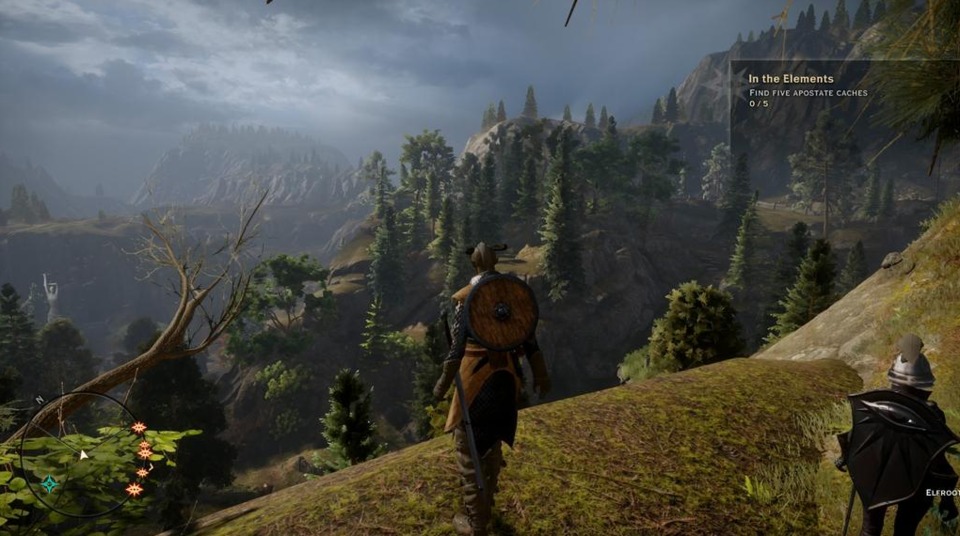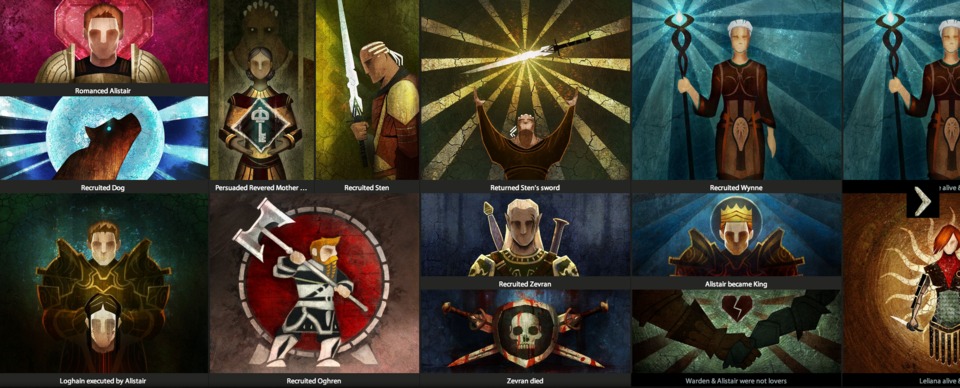Here's the short version of this piece: if you've never played Dragon Age before, that's not a good reason to punt on Dragon Age: Inquisition. With a little bit of background reading, the world and lore make total sense, and the learning curve is small. If you're interested in the longer version, keep reading.
I woke up several hours before work yesterday morning to squeeze in another 90 minutes with Inquisition. With a cup of coffee by my side, I slowly, cautiously began exploring the huge landscapes in BioWare's latest, and soon came to this cliffside, which prompted an intense moment of introspection.

It became clear I'd be spending many, many hours with Inquisition in the weeks (months?) ahead. It's not going to surprise me if I'm over the 100-hour mark by the end. Right now, my clock reads just under five hours, but I'm having the same fuzzy feelings when I first entered the world of Skyrim. "Welcome, Patrick. You're going to be here a while. Be prepared to read lots of notes. They're well-written."
For whatever reason, CRPGs went over my head when I was younger. Summer vacations were spent with Chrono Trigger and Final Fantasy, not Baldur's Gate and Planescape Torment. When Dragon Age: Origins was being praised as BioWare's great CRPG revival, a chance for the studio to remind the world about a subgenre gone by, I took one look at the game's combat and moved on. Deep customizing of AI systems? Sorry, no thanks. Skipping Dragon Age: Origins meant I didn't blink an eye when Dragon Age 2 was released, either. Of course, it helped almost nobody enjoyed Dragon Age 2. One less game to play, phew!
But we often confuse what we dislike with the unfamiliar. The two feel very similar, and it usually speaks to an understandable desire to seek out what want to enjoy as efficiently as possible. Risks are risks because there's a chance of failure or disappoinment. Though my rhetoric casts the decision to play one game over another in hyperbole, time is precious. What we choose to spend our days with should count for something, and we should ensure it's meaningful. Sometimes, that means going out on a limb. Other times, it means indulging in digital comfort food. Both are totally okay.
If you've followed my work at Giant Bomb, you know how I've tried to move outside of my comfort zone in the past few years. I want to give unfamiliar genres and series a chance, long after I've rendered judgement on them. "Oh, this isn't for me." But maybe it is? It's been revelatory. Visual novels? Thanks to 999, I'm obsessed with Danganronpa. Strategy games? XCOM led me to Fire Emblem, Fire Emblem led me to Shadowrun, and Shadowrun led me to The Banner Saga. During the summer doldrums, Brad sent me an IM after playing a few hours of Divinity: Original Sin. He compared Divinity to an overhead Skyrim. (The game isn't very much like Skyrim, but the broad strokes--big, open world with tons to explore--was why we fought so hard for Skyrim during game of the year way back when. Sorry, Saints Row: The Third.) I fell for Divinity, and the game expanded my palette wide enough to give Inquisition a chance.
When faced with a sequel, it's natural to consider playing the games that came before it. This is also a convenient way to convince yourself it's not worth giving the new game a shot. "Well, I'm not going to understand what's going on, so what's the point?" This is what I told myself before playing Witcher 2, yet I had no problem jumping in and having a great time. (Now, I'm super excited for Witcher 3 next year!). Trying to play Origins and Dragon Age 2 could take hundreds of hours, which is off the table for most people. Inquisition alone, by most estimates, will take players more than 50-60 hours to see through. While most game stories require little more than browsing a Wikipedia summary, BioWare RPGs are full of choices. Characters live, die, and fall in love based on what the player decides. The main plots in modern BioWare games always take a backseat to smaller character moments influenced by players.
Thus, BioWare created Dragon Age Keep. It's an enormous database filled with every critical decision from the first two games, and allows players to generate a save to import into Inquisition. Sounds great, right? Unfortunately, "enormous" might be the understatement of the year. Dragon Age Keep is well-crafted, a wonderful resource for series veterans who might be switching platforms or reconstructing a lost save, but without emotional context for the literally hundreds of decisions to be made about the many events in the previous Dragon Age games, I was finding it easier to bury my head in my hands than make any real choices. It was pretty funny to kill off any character on a whim, though.

While poking at Dragon Age Keep, the sweeping intro music for Inquisition was blaring downstairs. Stress started to creep in. Familiar excuses started to rear their head. I could be playing Far Cry 4, the sequel to a game I was already familiar with. I should check out Bayonetta 2, since I've heard good things, and who hasn't played lots of character action games? (For the record, I still want to play both.)
I took a deep breath, closed the tab on Dragon Age Keep, and shut down my laptop. I started a new game, and accepted the default choices. What I don't know can't hurt me, and cameos aren't going to mean anything to someone who can't reasonably tell you what happened in the previous games.
It only took a few minutes to get up to speed. It's entirely possible series fans are upset how action-friendly BioWare's made Inquisition, but it also means just about anyone can understand the basics by the time the first combat sequence is over. There will be plenty of nuance to discover, but I understand what it means to hit a dude with a sword, wait for special moves to cool down, and heal myself.
And this is where my ignorance becomes an asset, not a liability. Understanding long-brewing politics between races, religions, and territories is wonderful and mysterious. I'm having a blast reading codex entries--something I almost never do--and I'm constantly pausing to seek out extended summaries. Even though Inquisition represents the third game in the Dragon Age series, it's not the conclusion of a trilogy. There's dangling threads from the previous games, but everything hasn't been building to this event. It's simply another chapter, and one that invites newcomers as much as it rewards veterans.
A few hours in, a progress meter said I'd explored two of 26 secions. In my mind, it made sense I'd briefly visit a bunch of locations I'd spend more time with later, but it dawned upon me the game was logging how many sections I'd visited in this one area alone. There are lots of "areas" in Inquisition, which means there are many, many sections. Hundreds? Thousands? Whereas similar revelations would generate dread, this prompted me to climb a mountain, take the screen above, and take a deep breath.
I've never played a Dragon Age game before, but I'm sure as hell glad I jumped on this one.